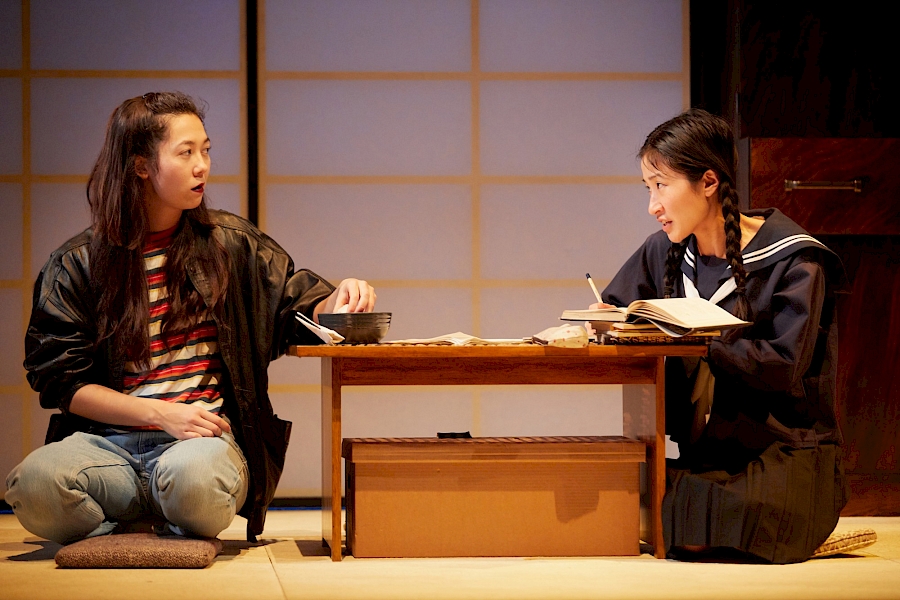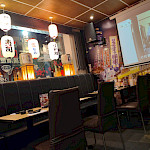3 Feb 2024
JETAA News

30th March 2018
The Great Wave: play review
It begins with a flash of lightning. Hanako (Kirsty Rider) and Reiko (Kae Alexander) are squabbling sisters living with their mother, Estuko (Rosalind Chao), on the west coast of Japan in 1979.
Their classmate Tetsuo (Leo Wan) comes round to study that stormy evening, heralding a proxy battle between them. The rebellious Hanako follows his mock-bravura suggestion to go down to the beach to watch the churning seas, and is swept away by ‘the great wave’ of history, although one strange and little known in the UK.
Between 1977 and 1983, 17 or more Japanese citizens were abducted by North Korea. Seemingly, the regime’s plan was to convert them to its ideology of subservience to the ‘dear leader’ and turn them to spying on its behalf. When this failed, they ended up teaching Japanese to Korean agents.
Tetsuo comes under suspicion for Hanako’s disappearance. His family is ostracised and moves away. 17-year-old Hanako is woken up by screaming guards in North Korea. Her captors promise that she may eventually be allowed to return home, if she can help a Korean woman, her new ‘sister’, pass for Japanese.
Reiko and Etsuko’s lives becomes frozen in time, only starting up again when Tetsuo appears many years later as an amateur sleuth cum journalism who has put together this chain of unlikely disappearances. He helps the initially reluctant Tanaka’s publicise their plight and challenge the Japanese government on its silence.
The fast-paced narrative flicks between either side of a stunning, revolving set: a traditional Japanese interior with shōji paper doors on one side and a cell then home (with Kim Il-sung’s portrait now joined by Kim Jong-il’s on the wall) on the other. Crackling video art accompanies each transition, heightening the pace of a plot, which skates over 24 years – the two hours of stage time fly by – weaving in more historical details of Japanese-Korean relations. The backdrop of anxiety over the unknown strength of North Korean armaments is inevitably contemporary.
The playwright, self-described ‘Japanese Ulsterman‘ Francis Turnly has said, “The play is basically about the identity of Japan and the identity of North Korea.” For me, this slight misassessment captures what keeps this immensely gripping work of theatre from being even better. The spirited arguments between Hanako and her pupil over why one or the other can’t become Japanese or North Korean, or why they'd want to, fall somewhat short compared to the vivid depiction of ‘ordinary’ people living with each other in extraordinary circumstances.
Director Indhu Rubasingham (The Tricycle Theatre’s artistic director) extracts some very moving performances from her cast, especially given how easily this subject matter could become melodramatic or garish. Rider as Hanako, who by the end has a Korean family, really convinces as a character based in fact who is nonetheless unbelievable. The writing’s real skill is in seamlessly combining intense, personal emotions with the monolithic forces at play. Reiko and Tetsuko, who found a group for families of suspected abductees, eventually win a government audience, coming up against a haughty minister who pronounces frankly, “I’m not usually spoken to like this.”
And yet we come to sympathise with even this figurehead of the government’s cold realpolitik. He helps – or might do – to bring about the play’s concluding events, themselves drawn from history, which provide a just enough satisfying end to this thriller. With compelling relationships, strong acting and a really gripping subject matter this is a riveting work of theatre, which sticks in the mind and narrativizes an incredible history.
The Great Wave is on at the Dorfman Theatre, London, until 14 April. Visit the National Threat's website for tickets and more information









